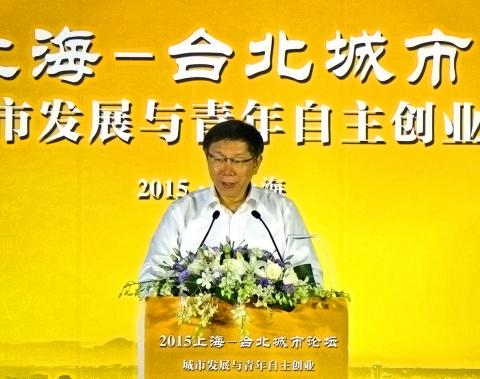Taipei Mayor Ko Wen-je (柯文哲) yesterday expounded on his views on cross-strait relations at the Taipei-Shanghai forum, touting what he called the “2015 new standpoint,” which he said is built on “four reciprocal processes” and a motif that both sides of the Taiwan Strait are “one family.”
Ko made the remarks during his speech at the opening ceremony for the forum.
Ko started his speech by talking of the impermanence of the world today, before narrowing his subject down to what he described as the “long-lasting friendship” between Taipei and Shanghai.

Photo: CNA
“This is an ever-changing world. Seven years ago, who would have thought that the iPhone would change the world? A year ago, who would have thought that I would become the mayor of Taipei? Just a month ago, who would have thought that I would be standing here in front of you today?” he said. “However, one thing remains unchanged, and that is the long-lasting friendship that Taipei and Shanghai have established.”
Ko said that his stance on cross-strait relations and the forum can be summarized as “one family across the Strait” and four “reciprocal” actions: to know each other, to understand each other, to respect each other and to work with each other.
He said that he has always abided by these principles to promote exchanges and increase goodwill across the Taiwan Strait, and that he hoped that Taipei and Shanghai would build on their “political common ground” and work together to boost cross-strait exchanges and push for peaceful development to serve the best interests of people on both sides of the Strait.
Responding to media queries after the speech, Ko said that he proposed the “2015 new standpoint” in March, and that he sees it as a new direction and starting point for cross-strait exchanges.
Asked whether he was concerned that his stance would spark controversy in Taiwan, he said: “I do not expect all political parties to accept it, but at least it would be tolerable. There has got to be something on the table so that everyone can engage in exchanges.”
He said that the greatest consensus formed between him and Shanghai Mayor Yang Xiong (楊雄) during the organization of the forum concerns the employment of a novel method in which “the public goes first; the government supports.”
“I believe that this method would also apply to future cross-strait exchanges. Through organizing forums, members of the public can discuss the issues among themselves. The government can then provide the necessary help according to the conclusions they reach,” he said, adding that the epiphany was his biggest reward during his visit to Shanghai.

MAKING WAVES: China’s maritime militia could become a nontraditional threat in war, clogging up shipping lanes to prevent US or Japanese intervention, a report said About 1,900 Chinese ships flying flags of convenience and fishing vessels that participated in China’s military exercises around Taiwan last month and in January have been listed for monitoring, Coast Guard Administration (CGA) Deputy Director-General Hsieh Ching-chin (謝慶欽) said yesterday. Following amendments to the Commercial Port Act (商港法) and the Law of Ships (船舶法) last month, the CGA can designate possible berthing areas or deny ports of call for vessels suspected of loitering around areas where undersea cables can be accessed, Oceans Affairs Council Minister Kuan Bi-ling (管碧玲) said. The list of suspected ships, originally 300, had risen to about 1,900 as

Right-wing political scientist Laura Fernandez on Sunday won Costa Rica’s presidential election by a landslide, after promising to crack down on rising violence linked to the cocaine trade. Fernandez’s nearest rival, economist Alvaro Ramos, conceded defeat as results showed the ruling party far exceeding the threshold of 40 percent needed to avoid a runoff. With 94 percent of polling stations counted, the political heir of outgoing Costa Rican President Rodrigo Chaves had captured 48.3 percent of the vote compared with Ramos’ 33.4 percent, the Supreme Electoral Tribunal said. As soon as the first results were announced, members of Fernandez’s Sovereign People’s Party

MORE RESPONSIBILITY: Draftees would be expected to fight alongside professional soldiers, likely requiring the transformation of some training brigades into combat units The armed forces are to start incorporating new conscripts into combined arms brigades this year to enhance combat readiness, the Executive Yuan’s latest policy report said. The new policy would affect Taiwanese men entering the military for their compulsory service, which was extended to one year under reforms by then-president Tsai Ing-wen (蔡英文) in 2022. The conscripts would be trained to operate machine guns, uncrewed aerial vehicles, anti-tank guided missile launchers and Stinger air defense systems, the report said, adding that the basic training would be lengthened to eight weeks. After basic training, conscripts would be sorted into infantry battalions that would take

GROWING AMBITIONS: The scale and tempo of the operations show that the Strait has become the core theater for China to expand its security interests, the report said Chinese military aircraft incursions around Taiwan have surged nearly 15-fold over the past five years, according to a report released yesterday by the Democratic Progressive Party’s (DPP) Department of China Affairs. Sorties in the Taiwan Strait were previously irregular, totaling 380 in 2020, but have since evolved into routine operations, the report showed. “This demonstrates that the Taiwan Strait has become both the starting point and testing ground for Beijing’s expansionist ambitions,” it said. Driven by military expansionism, China is systematically pursuing actions aimed at altering the regional “status quo,” the department said, adding that Taiwan represents the most critical link in China’s